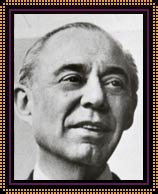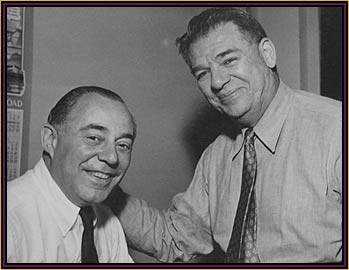 Richard Rodgers demonstrated his musical talent at an early age. By the time he was four he had begun to pick out tunes from “The Merry Widow” on the piano and ten years later he wrote his first song, “My Auto Show Girl.” Soon he began to compose songs for amateur productions. While attending Columbia College he was honored to be the first freshman ever to write the score for the annual varsity show.
Richard Rodgers demonstrated his musical talent at an early age. By the time he was four he had begun to pick out tunes from “The Merry Widow” on the piano and ten years later he wrote his first song, “My Auto Show Girl.” Soon he began to compose songs for amateur productions. While attending Columbia College he was honored to be the first freshman ever to write the score for the annual varsity show.
At Columbia, Rodgers met Lorenz Hart and the two became collaborators for the next 20 years. The vastly different life styles and temperaments of the men made them seem unlikely associates, with the disciplined and meticulous Rodgers playing “Teacher to Hart’s Errant Schoolboy,” as Bobby Short described it. It was “a case of love at first sight,” however, and the two formed a successful Broadway partnership until shortly before Hart’s death in 1943. Some of their hit songs included “My Funny Valentine,” “The Most Beautiful Girl in the World,” “Manhattan,” “Thou Swell,” “Johnny One Note,” “Blue Moon,” “The Lady Is a Tramp,” and “Bewitched, Bothered, and Bewildered.”

His second successful partnership, with lyricist Oscar Hammerstein II, lasted for more than 15 years.
In 1943, Rodgers teamed up with another Columbia friend, Oscar Hammerstein II, forming one of the best known songwriting teams in the history of the American musical. Their first collaboration was the Pulitzer Prize winning play, “Oklahoma!” This innovative play was the first ever to fully integrate music and dance into the plot. Critics praised the songs for their appropriateness to the mood and character of the play. Several of the songs became popular hits, especially, “Oh, What a Beautiful Mornin'” and “People Will Say We’re in Love.”
Rodgers and Hammerstein proceeded to produce a continuous stream of Broadway hits until Hammerstein’s death in 1960. Many of the plays were adapted as motion pictures, the most profitable being THE SOUND OF MUSIC. Some of their best-loved songs included: “June Is Bustin’ Out All Over” and “If I Loved You” from “Carousel”; “I Enjoy Being a Girl” from “Flower Drum Song”; “Getting to Know You” from “The King and I”; “Some Enchanted Evening” and “I’m Gonna Wash that Man Right Outta My Hair” from “South Pacific”; and “My Favorite Things” and “Edelweiss” from “The Sound of Music.”
Richard Rodgers
- "Allegro"
- "Annie Get Your Gun"
- "The Boys from Syracuse"
- "By Jupiter"
- "Carousel"
- "A Connecticut Yankee"
- "Flower Drum Song"
- "Garrick Gaieties"
- "Jumbo"
- "The King and I"
- "No Strings"
- "Oklahoma!"
- "On Your Toes"
- "Pal Joey"
- "The Sound of Music"
- "South Pacific"
- "State Fair"
- Irving Berlin
- Alfred Drake
- Dorothy Fields
- Oscar Hammerstein II
- Lorenz Hart
- Gene Kelly
- Joshua Logan
- Mary Martin
- Ethel Merman
- John Raitt
- Peter Stoneex:
- Robin Wagnerex:
Commenting on his work, Rodgers told Mary Tanenbaum, “I guess I am proudest of ‘Carousel,’ because I like the score best and what the show has to say — based, of course, on the ‘Liliom’ of Molnar — about a man who really didn’t know how to love his wife and child until too late. …”
Rodgers’ autobiography, MUSICAL STAGES, contains anecdotes about the composer’s experiences writing Broadway musicals. Margo Jefferson remarked that “in his implacably good-tempered, judiciously written autobiography, Richard Rodgers emerges as all of a piece: a man who knew what he wanted, who got it through a dedication to work that has been total but dispassionate, and one whose supreme gifts as a writer of popular songs remain a mystery — above all to himself.” Mel Gussow reflected, “What makes this book a special pleasure are the reminiscences of those thriving days when songwriting seemed like the headiest occupation in the world.”
Source: Excerpted from CONTEMPORARY AUTHORS ONLINE, Gale Group, © 2003 Gale Group. Reprinted by permission of The Gale Group.
Photo credits: Photofest and the Library of Congress

